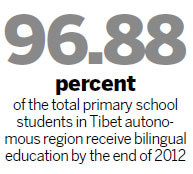Modern information-sharing technology that supports the Tibetan language has been hailed by an expert in cultural preservation and the protection of religious beliefs in the Tibet autonomous region.
"With the use of the Tibetan language on the Internet and on mobile phones, Tibetan people, especially the younger generation, can easily access the outside world," said Galsang Drolma, an assistant researcher at the China Tibetology Research Center.
This technology also makes it possible to preserve literary works written in Tibetan, such as poetry, which are full of rich cultural connotations, she said.
"It also enables people outside Tibet to have the chance to learn about pure Tibetan culture," she said.
Her comments came after the Information Office of the State Council issued a white paper on Tuesday outlining development in Tibet over the past 60 years.
Use of the Tibetan language is becoming increasingly IT-based, the white paper states.

"There have been national and international standards for computer coding of Tibetan characters. Tibetans can read, listen to and watch domestic and international news and get all types of information in the Tibetan language from the Internet, mobile phones and other means," the paper says.
The study and use of the Tibetan language and script are protected by law in China, and bilingual education, with Tibetan as the principal language, is widespread in Tibet, the white paper states.
By the end of 2012, a total of 282,914 primary school students were receiving bilingual education in Tibet, accounting for 96.88 percent of the total.
There were 23,085 bilingual teachers and 3,700 Tibetan- language teachers at schools of different levels, the paper said.
Galsang Drolma said people have benefited greatly from national investment and policy support for the education sector over past decades.
"The authorities should give more consideration to improving the quality of education in the future, because some remote areas of Tibet still face a great shortage of good teachers," she said.
The paper says local people's freedom to attend religious services, perform sacrificial rituals and take part in major religious activities and folk festivals is respected and protected.
Tibet has 1,787 venues for different religious activities, more than 46,000 resident monks and nuns, and 358 living Buddhas, it states.
Tsering Choidron, a 19-year-old nun in the county of Gyangze, who has been studying at Sakya Buddhism College for three months, said she enjoys talking and communicating freely with her classmates during her studies.
"We have freedom to attend religious activities and there is no limit on discussion and debates in the college," she said.
The white paper states that the Tibetan people have gained freedom, equality and dignity, and are fully enjoying the fruits of modern civilization.
The per capita net income of farmers and herdsmen has maintained double-digit growth for 10 consecutive years, reaching 5,719 yuan ($933) in 2012. The per capita disposable income of people in urban areas was 18,028 yuan, it says.
|
|
|
|
|
|
|
|
